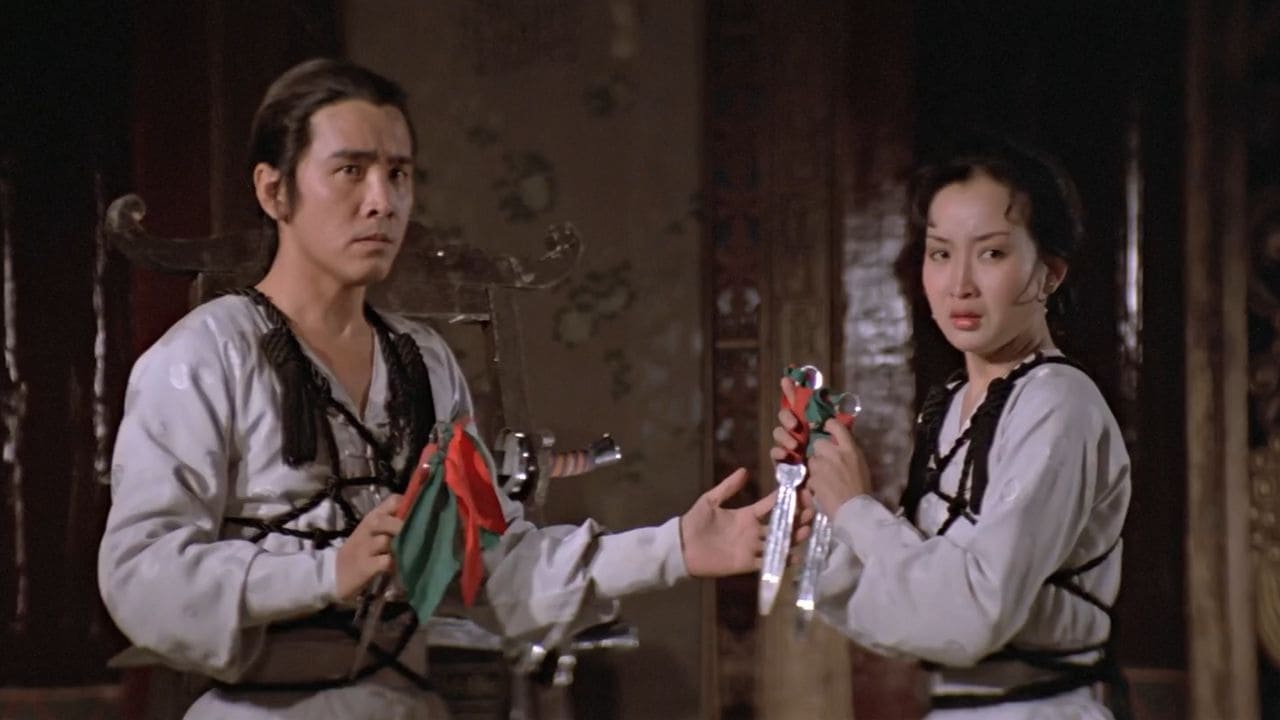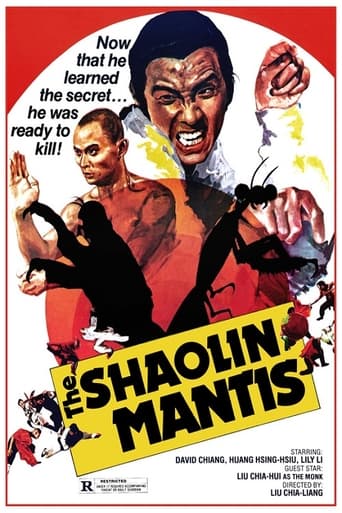Majorthebys
Charming and brutal
Comwayon
A Disappointing Continuation
BelSports
This is a coming of age storyline that you've seen in one form or another for decades. It takes a truly unique voice to make yet another one worth watching.
Cody
One of the best movies of the year! Incredible from the beginning to the end.
dmuel
This is an unusual and interesting story of the often conflicting, or even contradictory obligations in certain situations in a Confucian society. It is also quite bleak in its conclusion, which often occurs in Shaw Brothers, revenge-driven Kungfu movies, but more so given the conflict of family, romantic and social ties in this film. An oft-recurring theme in Shaw Brothers' films is the lingering Ming resentment of Qing rule, which also is prominent in this one. There are historic inaccuracies, such as a romantic lead, Chi-chi, who happens not to have bound feet, which would never have occurred in a noble family circa early Qing dynasty, and this would have precluded any martial arts study for women. But the dominant story plot is the hero's conflicting obligations to family, political loyalties and the intimate affairs of the heart. None of this becomes clear until the second half of the movie, although it is clearly outlined early in the film. Some of the romantic elements develop slowly, perhaps a bit tediously, in the first part of the movie, but conflict deepens quickly with the resultant tragedy and grim conclusion of the film. The "mantis" element in the film seems slightly contrived, and unessential to the broader thrust of the movie, and some of the early fight scenes in the movie lack the luster of other Shaw Brothers' efforts. But the movie is still worth a look!
Mal 1978
Okay, I don't expect any classic kung-fu movie to have an intricate, well-crafted plot. But most classic kung-fu movies do have a simple, but understandable and logical plot. You understand why the characters behave the way they do.Not in this movie. Most of the characters in Shaolin Mantis behave in unnecessarily homicidal & down-right dirt stupid ways. Backstabbing deaths that could have been avoided with just a little discussion between characters who are supposed to care about one another, aren't avoided. Unnecessary deaths & conflicts which could have been avoided with just a little common sense, aren't avoided. It's like most of the characters in this movie took a permanent dumb pill. Too many things in this movie just don't make sense, and that includes the stupidly plotted twist ending.Some classic kung-fu movies I've watched again & again & again (like Fatal Needles, Fatal Fist). This one I don't want to ever see again.Still, I give it 3 stars because the set decorations and the fights are decent enough.
poe426
Wei Feng (David Chiang), who is both an outstanding scholar and martial artist, is put to the test by The Emperor and overcomes a Mongol and a priest (Gordon Liu). Satisfied that Feng is up to the task, he dispatches him to the home of the Tien Clan (whom he suspects are guilty of treason) to spy on them. To ensure that Feng does as he's told, The Emperor blackmails Feng, threatening his family. Feng meets Zhizhi, Tien's granddaughter, and she fancies him right away. When Tien learns that Feng is a spy, he makes plans to kill him- whereupon Zhizhi saves Feng by claiming that the two of them are lovers. Instead of the "proposed" execution, a wedding is planned. When Feng insists on returning to his family, he and Zhizhi must run a family gauntlet to get out of the Tien home. This is where some beautifully choreographed fight scenes come in- fight scenes that rival the director's work in the later LEGENDARY WEAPONS OF CHINA. There's a wildly improbable escape that involves the sudden appearance of a dummy (strapped to Feng's back!), but the subsequent scenes wherein Feng observes and then imitates the fighting style of a praying mantis more than makes up for it. Throughout the dubbed version, the Goblin soundtrack from George Romero's DAWN OF THE DEAD is put to good use. But it's the twist ending that makes SHAOLIN MANTIS most memorable.
Brian Camp
SHAOLIN MANTIS (1978, aka THE DEADLY MANTIS) ranks among the best work of premier kung fu director Lau Kar Leung (aka Liu Chia Liang), who's better known for THE 36TH CHAMBER OF SHAOLIN, 8-DIAGRAM POLE FIGHTER, HEROES OF THE EAST, and LEGENDARY WEAPONS OF CHINA. For the first three-quarters of its 102-minute length, MANTIS is more of a drama with kung fu scenes than a traditional martial arts film, as it builds up the tensions among a clan that learns of a traitor in its midst, but one they must tolerate in order to keep the clan patriarch's granddaughter happy. It's a complex story, slowly and deliberately crafted, that, for the most part, avoids casting anyone as good guy or bad guy. Every character has clearly understandable motives and the impending clash of loyalties is inevitable, but no less heartbreaking for being so.David Chiang plays Wei Fung, a young scholar recruited by the Emperor to infiltrate the Tien Clan in order to get evidence of the clan's connection to Ming loyalists and anti-Ching activities. If Wei fails in his mission, his own well-connected family will be punished. He infiltrates the clan by serving as tutor to Chi-Chi (Huang Hsin-Hsiu), the spoiled teenaged granddaughter of Tien (Lau Kar Wing). When Tien investigates Wei's background and finds out who he really is, lovestruck Chi-Chi saves Wei's life by marrying him and promising Tien that Wei will never leave the village. Eventually, Wei must get the information he has gathered back to the Emperor or his own family will suffer. This puts Chi-Chi in a difficult position and forces her to have to choose between husband and family. Although they are slow in coming, just after the midway point there are a number of intense fight scenes--a mix of straight kung fu and sword- and spear-play--featuring six major kung fu performers: Chiang, Lau, Lily Li, Wilson Tong, Norman Chu and John Chang.However, at the ¾ point, the film sharply shifts gears into more traditional kung fu territory, sending David's character alone into the wild to observe a praying mantis and develop the mantis style of fighting. He then returns to continue the fight. After some typically furious Lau Kar Leung-staged fights in the last 20 minutes, there is a genuinely surprising twist ending. The problem here is that the dramatic momentum built up by the interplay of moral obligations and family dynamics is somewhat dissipated, replacing intricate and complex character interaction with a final half-hour of more conventional kung fu practice and combat, albeit superbly done.The film is beautifully crafted and staged on lavish sets at the Shaw Bros. studio. The screenplay is by Szeto An (evidently filling in for regular Shaw Bros. scribe I Kuang and doing a great job). The fights are not quite as intricate as Lau's best fights (see 8-DIAGRAM POLE FIGHTER, HEROES OF THE EAST, and LEGENDARY WEAPONS OF CHINA), but they still rank among the best of the genre, particularly the final fight between David Chiang and Lau Kar Wing. Chiang may not have been as skilled a fighting star as Gordon Liu and Alexander Fu Sheng, but he was a fine actor and, when guided by the best fight directors, could put on a good show amidst better fighters.The real discovery in this film is actress Huang Hsin-Hsiu (aka Wong Hang Sau), who plays Chi-Chi. She's not only a competent fighter, but a powerful actress, mixing playful moments with strong dramatic scenes. For the first three-quarters, the film is really hers. Also in the cast are the great fighting femme Lily Li (as Chi-Chi's mother), Lau Kar Wing (aka Liu Chia-Yung, the director's brother), Norman Chu, and Wilson Tong (who also served as co-fight choreographer with the director). Gordon Liu makes a cameo appearance as (what else?) a monk who fights David briefly in the opening sequence. Special mention should also be given to the praying mantis that shares a few scenes with David. Either this is an expertly crafted moveable model or an incredibly well-trained mantis! (Truth to tell, it looks real to me.)While the film's structural flaw is not fatal, it does keep it from being one of the absolute best of the kung fu genre. Still, fans of Shaw Bros. films who don't mind drama and characterization mixed in with martial arts will be amply rewarded.

